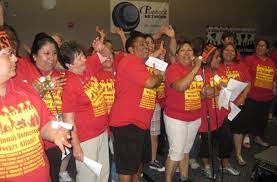
“Many thousands of domestic workers are employed in New York state as housekeepers, nannies, and companions to the elderly. The labor of domestic workers is central to the ongoing prosperity that the state enjoys, and yet, despite the value of their work, domestic workers do not receive the same protection of many state laws as do workers in other industries. Domestic workers often labor under harsh conditions, work long hours for low wages without benefits or job security, are isolated in their workplaces, and are endangered by sexual harassment and assault, as well as verbal, emotional and psychological abuse. Moreover, many domestic workers the state of New York are women of color who, because of race and sex discrimination, are particularly vulnerable to unfair labor practices. Additionally, domestic workers are not afforded by law the right to organize labor unions for the purpose of collective bargaining. The legislature finds that because domestic workers care for the most important elements of their employers’ lives, their families and homes, it is in the interest of employees, employers, and the people of the state of New York to ensure that the rights of domestic workers are respected, protected, and enforced.”
Thus opens the New York Domestic Workers’ Bill of Rights, signed into law by Governor Paterson, August 31, 2010, after a six and some year mighty campaign waged by Domestic Workers United, or DWU, and their allies. This is the first such law to be passed in the United States, where domestic workers and farm workers have been excluded from labor laws. It is a historic moment. An unforgettable day.
Priscilla Gonzalez, DWU Executive Director and the U.S.-born daughter of an Ecuadoran woman who works as a housekeeper, said, “We’ve made history today, not just for us, but for generations to come to prove that change can happen when we stand for dignity, justice, & respect for all!”.
Patricia Francois, a DWU member and nanny originally from Trinidad, explained, “We work long hours, no overtime pay. My experience, after working six-and-a-half years, never had an increase in salary, as well as no overtime pay. At times, if you work on your vacation, if you don’t stand up for that vacation pay, you will not get it. You know, and it’s hard at times—when you stand up for yourself, that is the time the abuse comes in. You get a verbal abuse. You get threatened with immigration. And it’s wrong. It’s wrong.”
Nannies struggle for respect and recognition, and the New York Domestic Workers Bill of Right is an important first step in that struggle. It’s about emancipation, freedom. As DWU member and nanny Dolores Wright noted, it’s a struggle for emancipation from abuse and exploitation. As Bill sponsor Delegate Keith Wright proclaimed, “”President Lincoln signed the Emancipation Proclamation in 1865. Here we are in 2010.Governor Paterson will sign his version of the Emancipation Proclamation.”
Emancipation. For housekeepers, nannies, and companions to the elderly. What would nanny emancipation look like? What is a nanny?
For some, such as those who write dictionaries like the Oxford English Dictionary, a nanny is a “person, esp. a woman, employed by a family to look after a child or children; a children’s nursemaid. A grandmother.” For those people, nanny comes from Anne or Agnes.
But another river runs through the word, nanny, a river that betokens insurgency, militancy, national liberation. That’s the nanny of Jamaica’s Queen Nanny, the early eighteenth-century leader of the Windward Jamaican Maroons, a National Hero. According to historian Karla Gottlieb, Queen Nanny is the mother of us all, because “Nanny had at least two significant contributions that changed the direction of the modern world: first, she developed Guerrilla warfare and the tactics she used were later studied by military strategist in the Vietnam War and others. Second, because she and her people established the first independent black polity in the New World, she led the way for freedom struggles in Haiti, Brazil, the U.S., Guadelope, Surinam… – anywhere where there were enslaved Africans. Without the work of the Maroons under her leadership, I believe the world would be a different place.”
This is the Nanny that is kept out of the stories of domestic worker organizing and emancipation. The Nanny of shrewd and insightful guerilla warfare, the Nanny of coast-to-coast freedom struggle.
In the words of Jamaican dub dub poet Jean Binta Breeze, Nanny is the fervor of freedom, and it’s time to honor her name and life, in actions and deeds. Blow the trumpets, sound the abeng. Nanny emancipation includes and values a Domestic Workers’ Bill of Rights, it insists on employers treating workers with respect and dignity, and it also dreams of national liberation, of a nation-State and a world in which every Nanny shall govern.
so mek wi soun de abeng fi Nanny
(Photo Credit 1: Colorlines)